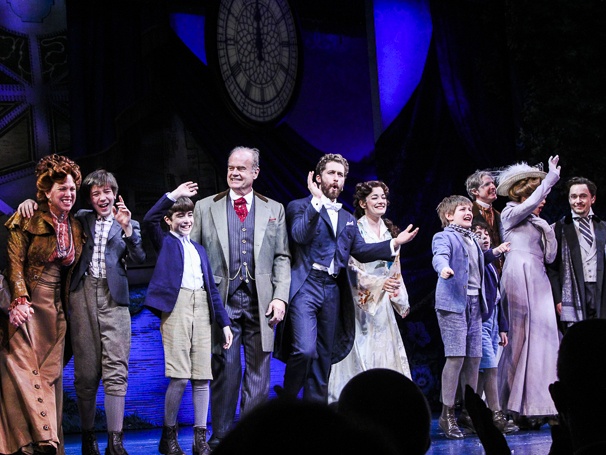‘Finding Neverland’ For the Child in All of Us
Keely Chisholm ’17 / Emertainment Monthly Staff Writer

Based on the movie of the same title, Finding Neverland follows Scottish playwright J.M. Barrie as he struggles to pick up his career. Once lauded for his work, his recent plays have garnered poor reviews, and the actors are performing to half-empty theaters. Under pressure to produce something new, he meets a curious family in the park one day—Sylvia Llewelyn Davies and her four sons: George, Peter, Jack, and Michael. As Barrie spends more and more time with the family, he becomes inspired, and begins to write something fantastical. It becomes an immediate West End hit; we know it today as Peter Pan.
With Matthew Morrison as Barrie, Teal Wicks as his wife, Laura Michelle Kelly as Sylvia, Carolee Carmello as Mrs. du Maurier, Paul Slade Smith as Charles Frohman and Captain Hook, Aidan Gemme as Peter, Christopher Paul Richards as Jack, Sawyer Nunes as George, and Alex Dreier as Michael, the musical glittered with imagination and heart.
In a word, it was magical; however, it’s magical in a much more grounded way than one might think. Then again, it’s less about Peter Pan himself than the real-life man behind him. But the special effects aren’t lacking in any way: from transforming the stage into a pirate ship and swirling columns of golden glitter to, yes, Peter Pan flying, it’s visually spectacular, but not unnecessarily so.
Something else Finding Neverland does a seamless job of is sliding in and out of reality. There’s a number toward the end of the first act called “Circus of Your Mind,” in which the play producer, Barrie’s wife, and Mrs. du Maurier, Sylvia’s mother, all sing about the tangled mess that is Barrie’s head. Throughout, the ensemble dances as his thoughts personified, some as ticking clocks, some with poles like those on merry-go-rounds. Combined with the use of projections on the sets, the result is a surreal effect that doesn’t leave you wondering when the trip is over. There’s no minute of blinking before realizing that the characters are back in reality.
Musically, the songs flow—sometimes. The numbers work on their own, but the style isn’t always consistent throughout, jumping from dramatic power ballads (like “Stronger”) to the aforementioned “Circus of Your Mind,” which feels more macabre and almost Phantom-esque to the childish, lively romp of “Play.” Sometimes there was a tinge of the acoustic guitar that drove the music of Once. Because of this, the songs’ strength lay mainly in the lyrics. The book was clever, if anachronistic with some of the jokes, but enjoyable nonetheless.
The audience laughed and cried, felt the emotions of the characters, and got swept up in the production. It is the kind of musical that keeps a viewer wide awake and invested for the duration of the show, due in no small part to the believability of the cast.

Many critics have been highly, well, critical of the production. Writing for the Chicago Tribune, Chris Jones said it “lacks a journey” and “never feels logical.” Telegraph critic Matt Wolf said: “One only wishes that the score were less generic – a second-act duet between Barrie and Sylvia is especially vapid – and that the writing were as piquant as the stagecraft.” (NPR’s David Richardson, however, called it “the best musical of the season.”)
But for a musical to succeed, it has to resonate, first and foremost, with the audience. Critics may praise a show, but they’re not the ones filling the seats eight nights a week. No, it is really up to the audiences whether a musical will live on. Wolf also pointed out that poor or mixed reviews don’t necessarily equal a bad show: “Wicked received mixed reviews and has gone on to be a global phenomenon.” There is something about the Peter Pan story and the idea of retaining one’s inner child that resonates across generations and time periods.
It resonates with young kids, because, well, what little kid wants to grow up and lose naptime and playtime and carefree summer days playing outside? It resonates with college-age and young adults, who are quickly realizing that this whole “growing up” thing is harder than anyone told us. It resonates with parents, who are beginning to watch their own children grow up. And almost a century later, it’s still resonating. Just take a look at the wait time for the Peter Pan ride at Disney.

Finding Neverland reminds us all of the magic of youth, creation, and imagination. It reminds us that we can grow old, but don’t have to grow up. This is a story for everyone who has a child inside—that is, all of us.
Finding Neverland is playing at the Lunt-Fonanne Theatre in New York City. More information can be found at findingneverlandthemusical.com.